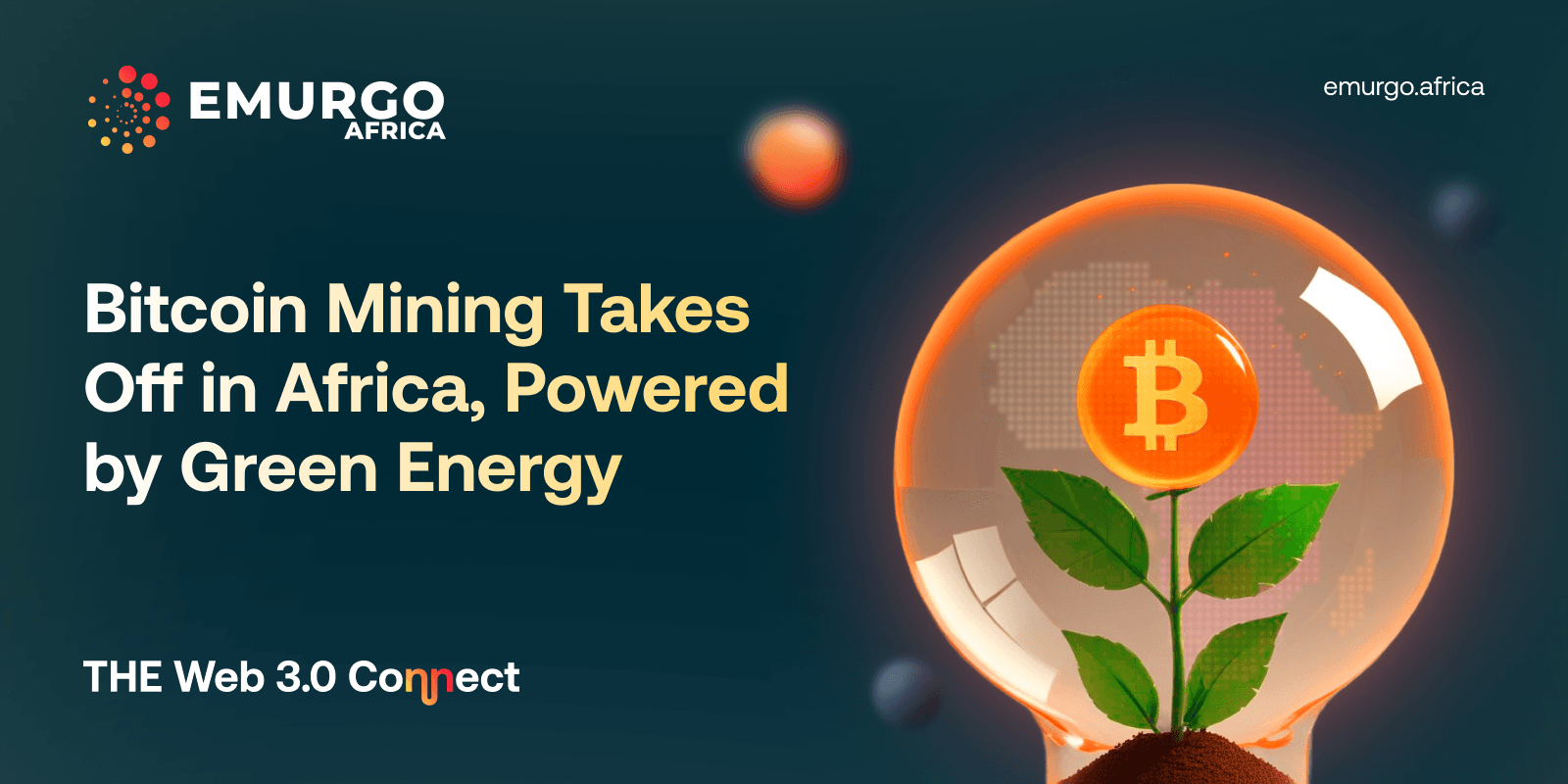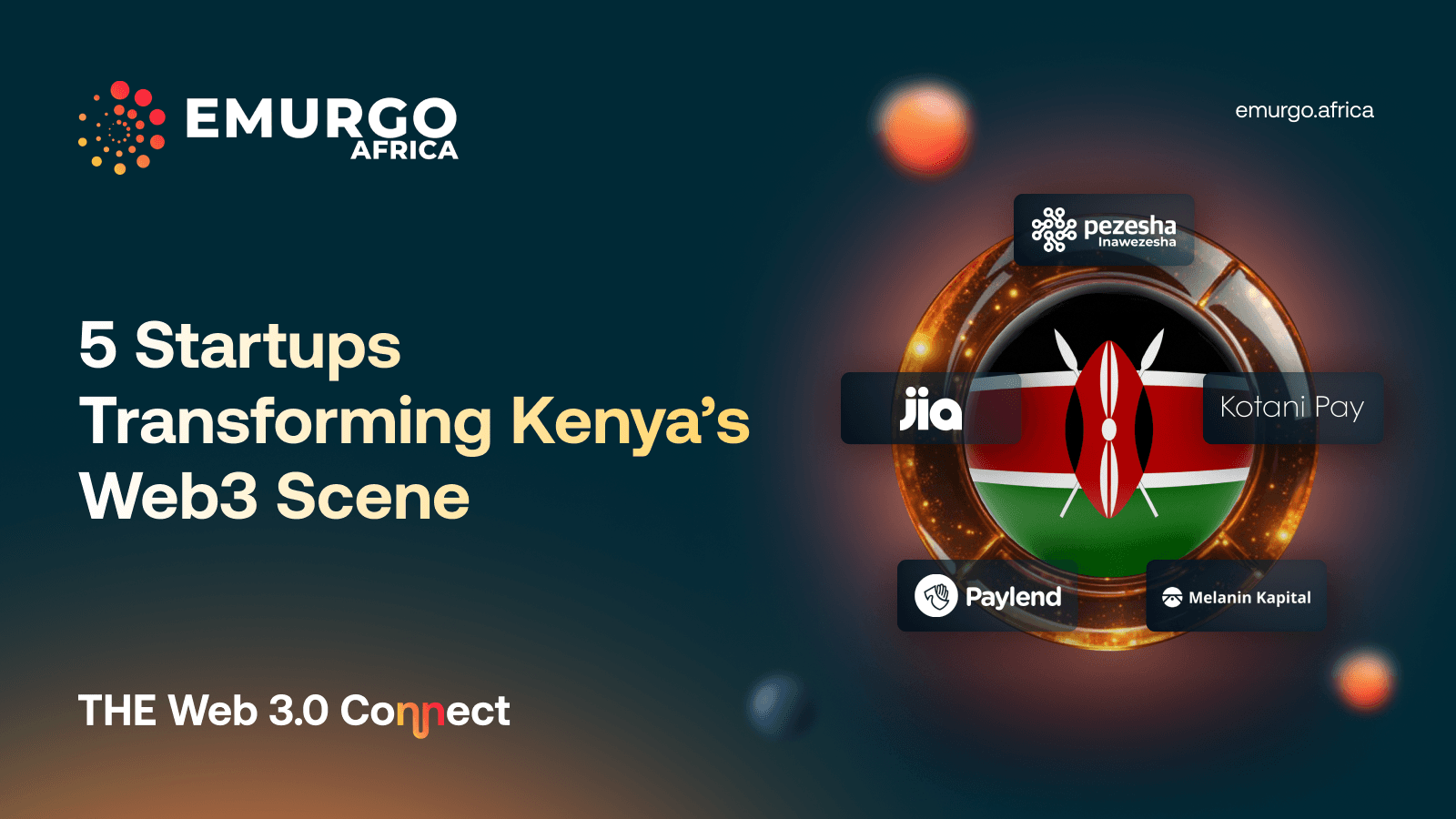By Shogo Ishida and Yosuke Yoshida, co-CEOs, EMURGO MEA
Across Africa, a new digital gold rush in the form of bitcoin mining is underway. Thanks to cheap electricity, China’s crypto mining ban, a tech-savvy population and supportive regimes, at least 10 countries in the continent are attracting large-scale bitcoin mining operations even as the cryptocurrency halved on April 19.

While there may be less than 2 million bitcoins left to mine out of the possible 21 million, mining activities in Africa have been greeted with excitement, with new jobs being created, and foreign currency injected into the economy.
The global cryptocurrency mining market size grew to $1.92 billion in 2022, and is projected to hit $7 billion by 2032. Africa wants a piece of this market as bitcoin’s value keeps rising.
Despite some countries experiencing power cuts and the fact that bitcoin mining is an energy intensive venture, their citizens see crypto as the new mode of store of value and an alternative to fluctuating value of local currencies. In most of the countries, miners use green energy.
Key Takeaways
- Ethiopia leads Africa in the rush into bitcoin mining.
- With more apps, bitcoin mining is now accessible to many Nigerians. A power plant for bitcoin mining is under construction.
- Kenya’s off-grid power system to mine bitcoins are powering up rural communities.
- In South Africa, crypto laws are causing bitcoin mining to flourish.
- Angola plans to ban bitcoin mining but operations continue.
- Libya is the most prolific miner of bitcoins in the Middle East and Africa.
- Most of Uganda’s bitcoin mining is small-scale but it's growing.
- Cheap power, strong currency are attracting bitcoin miners in Zambia.
- A village in Malawi got connected to electricity thanks to bitcoin mining.
- Bitcoin mining in the Virunga National Park is boosting the DRC’s conservation efforts.
Ethiopia is Africa’s Bitcoin Mining Nexus
Bitcoin mining, the process by which transactions are verified and added to the bitcoin blockchain, requires substantial computational power and energy. It's a competitive field where profitability hinges on factors like electricity costs, hardware efficiency, and regulatory environment.
Ethiopia, with its vast hydroelectric resources and government embrace of blockchain technology, has become a magnet for bitcoin miners, transforming the country into Africa's bitcoin mining powerhouse.
The allure for miners is simple: cheap electricity. Ethiopia boasts some of the lowest electricity rates globally, thanks to its massive hydropower dams like the Grand Ethiopian Renaissance Dam (GERD). According to Bloomberg, miners are securing power deals for as low as $3.14 cents per kilowatt hour, a fraction of the cost in other regions.
This cost advantage is proving irresistible, particularly for Chinese miners who have faced a crackdown in their home country. There are at least 21 mining firms, primarily Chinese, that have already inked deals with the Ethiopian government to establish large-scale mining operations.
Ethiopia started embracing Bitcoin mining in 2022, primarily due to the foreign currency payments made by companies for their electricity consumption. Ethiopian Bitcoin mining firm QRB Labs presented the mining as a viable solution to the government two years ago.
Over the past decade, the nation has bolstered its ties with China, evident in the involvement of numerous Chinese firms in the construction of the $4.8 billion GERD dam, which now serves as a power source for bitcoin miners.
In February, the Ethiopian government's investment arm, Ethiopian Investment Holdings (EIH), sealed a $250 million deal with Honk Kong-based West Data Group's Center Service PLC for the establishment of a substantial data center to oversee cryptocurrency mining activities.
Bitcluster, a Russian company specializing in bitcoin mining, has successfully established its inaugural 120 MW bitcoin mining complex. Concurrently, enterprises like Hashlabs Mining are embarking on the construction of bitcoin mining facilities in Ethiopia to cater to their international clientele.
Nigerians Rush Into Apps to Mine Bitcoin, Startups Set Up Green Sources of Power
Nigerians are finding a new way to tap into the global digital gold rush: mobile bitcoin mining apps. This surge comes amid a wave of innovation, as startups address the challenge of providing a cheap and reliable energy source for cryptocurrency mining. For many Nigerians, traditional mining rigs are out of reach due to their high cost and energy demands. However, the emergence of mobile apps like Sitefinity, Geomine, Digitrack, Bitmine, Minetracker and Hashflare has opened the door for anyone with a smartphone to participate. These apps allow users to remotely rent computing power from large-scale mining facilities, earning a share of the bitcoin mined based on their contribution. To make mining power affordable and environmentally sustainable, Lagos-based startup SunCoin provides solar-powered mobile mining units. These compact units, equipped with solar panels and high-efficiency mining chips, can be deployed in homes or businesses, offering a sustainable and cost-effective solution for individual miners.
In yet another effort towards green bitcoin mining, last November, Trojan Mining, a Nigerian crypto mining company that started operations in 2021, announced work is ongoing on the construction of a 500KW hydro-powered bitcoin mining facility in Nigeria.
This is expected to boost the available electricity supply and even make it affordable to miners. Trojan trains the youth on bitcoin mining and hires them. The company is a founding member of the Green Africa Mining Alliance—an umbrella of African bitcoin mining firms looking to use renewable energy for crypto mining. Other members are Gridless Compute and Sukuma Ventures in Kenya, BigBlock Datacenter in the Republic of Congo, QRB in Ethiopia, and Quantum Hash Ventures in Zambia.

Rural Communities in Kenya, Malawi and Zambia That are Empowered by Mining Firm
Gridless Compute, a Kenyan company specializing in the design, construction, and operation of bitcoin mining facilities, is pioneering bitcoin mining in the country. Established in 2022, the company has built hydro-electric mini-grids in Murang’a County, central Kenya in a partnership with HydroBox, an African hydroelectric power company.
These mini-grids utilize river water to generate electricity, powering bitcoin mining operations. In Murang’a, Gridless operates bitcoin mining sites, lowering energy rates for 2,000 people (500 families) in the area. The company says it has helped reduce the cost of electricity in the village from $10 per month to $4.
Through bitcoin mining, Gridless not only generates income to sustain its mini-grids but also delivers affordable electricity to over 1,800 households in Bondo, Malawi who live far from the national grid. In Malawi, Gridless works with power producers to keep the power price affordable. All of their employees are from the community. The fact that Malawi has a stable political environment is attracting bitcoin miners to the country.
The project has garnered attention from the global cryptocurrency community. Former Twitter (X) CEO Jack Dorsey's digital payments firm, Block, along with the bitcoin-focused venture firm Stillmark, spearheaded a $2 million seed investment into Gridless. The company intends to utilize this investment to expand its mining operations in Kenya, Nigeria, Ethiopia, Malawi and the DRC with investments in hydro, geothermal and biomass mini grids.
Apart from Gridless, Kenya’s largest electricity company KenGen issued an open invite to bitcoin miners to make use of its abundant geothermal energy in 2022. Kenya is the biggest geothermal energy-producing country in Africa.
In Zambia, although the central bank has cautioned against the risks associated with cryptocurrencies, it has not expressly forbidden bitcoin mining. In 2018, the Zambia Revenue Authority (ZRA) issued guidelines outlining the taxation procedures for cryptocurrencies, including bitcoin mining. A crypto law is currently underway.
Zambia may have a relatively modest mining presence, but its potential is considerable, owing to its affordable electricity rates, favorable business environment, and relative political stability compared to other African nations.
Gridless Compute has established operations in Zambia at minigrid sites similar to those in Kenya and Malawi. Typically, smaller-scale mining activities akin to those observed in Malawi are prevalent in the country. __ In South Africa, Bitcoin Mining Goes on Amid Load Shedding__
South Africa, long known for long periods of power blackouts due to load shedding, is also an active member of the bitcoin mining club in Africa.
The country, which scores the highest in crypto spending power in the continent, is experiencing a surge in bitcoin mining, especially in Western Cape and Johannesburg. Bitmart, Valr, and Luno are the biggest bitcoin mining business operators in South Africa. With the promise of lucrative returns, supported by crypto regulations, miners have set up mining operations, ranging from small-scale setups in homes to larger, industrial-scale operations.
South Africa’s electricity is predominantly coal powered, thanks in part to its vast coal reserves, but recent calls for a shift to renewable energy have seen bitcoin miners switch to energy sources like wind and solar. Bitcoin mining companies are developing mobile mining units powered by solar panels. These units can be deployed in remote areas with abundant sunshine, alleviating the strain on the national grid while bringing economic opportunities to underserved communities.
According to South Africa’s National Treasury, bitcoin mining is legal in the country, with the proceeds of bitcoin mining being subject to tax and exchange control regulations. South Africa's pragmatic approach to cryptocurrencies, with a focus on responsible crypto mining, creates a stable and predictable environment for miners. This, in combination with the country's existing advantages like cheap energy, positions it as a prime location for bitcoin mining to flourish.
In Angola Mining Continues Even as Government Plans to Ban Operations, Uganda and Namibia Hope to Grow Their Activity
Angola, despite a nationwide plan to ban cryptocurrency mining this year, has become an unexpected hotspot for bitcoin miners. The government's primary concern surrounding the ban is the environmental impact of energy-intensive mining operations.
The bill on Cryptocurrency and Other Virtual Asset Mining, set to be discussed by parliament, includes provisions for imprisonment for individuals found in possession of computer equipment, communication devices and infrastructure intended for crypto mining.
The country relies heavily on hydropower, and the strain on the national grid posed by large-scale mining is deemed unacceptable despite Angola having one of the largest hydroelectric production capacities of any country in Africa at 5.14 Gigawatts.
There has been a crackdown on bitcoin miners in recent months, but on the outskirts of the capital Luanda and at the borders, enterprising individuals have set up small-scale mining rigs, often powered by generators. For Angolans living in remote areas, cryptocurrency offers an attractive alternative to traditional financial systems with limited reach. As at April 2024, Angola was ranked fourth among African countries with the most crypto-mining operations. It follows Libya, Egypt and South Africa.
Uganda's presence in Africa's Bitcoin mining landscape is relatively modest, marked by minimal hashrate. However, there exist encouraging prospects for miners in the nation to leverage stranded hydroelectric power resources, especially those stemming from microgrids. Nevertheless, the majority of this mining activity remains small-scale due to Uganda’s limited hydroelectric potential.
At times, the Ugandan Central Bank and government have adopted stern or equivocal positions regarding cryptocurrency in general. However, there has been a shift in recent years, with officials creating avenues for regulating cryptocurrency enterprises.
In Namibia, though the government has created a crypto law - the Virtual Assets Act, it offers little clarity for service providers such as bitcoin miners. However, one company - Bitcoin Mining Namibia - is already supplying bitcoin mining equipment to local miners in its mission to ensure there is a “bitcoin miner in every household” using solar energy credit financing from the government.
Libya is the Top Bitcoin Mining Country in Africa and the Arab World
Libya tops Africa and the Middle East in terms of bitcoin mining hashrate in 2024. Hashrate is the total combined computational power used to mine and process transactions on the Proof-of-Work bitcoin blockchain. Although officially deemed illegal under Sharia law, Bitcoin mining has experienced a notable surge in Libya, attributed in part to the nation's low electricity expenses.
In 2021, Libyans accounted for approximately 0.6% of the global Bitcoin mining output, marking the highest rate in both the Arab world and Africa. This level of mining activity consumed roughly 2% of Libya's overall electricity production, equating to approximately 0.855 TWh annually.
Last year, Libyan authorities clamped down on bitcoin miners, arresting 50 Chinese nationals and seizing 100,000 mining devices, but bitcoin mining is still ongoing through underground mining facilities. With electricity costs as low as $0.004 per kilowatt hour (kWh), it remains the most attractive location for setting up crypto mining operations. If regulated, the sector could prove to be an economic opportunity for Libya.
Mining is Boosting the DRC’s Conservation Efforts
Virunga National Park, located in the north eastern region of the Democratic Republic of the Congo, achieved a significant milestone in 2020 by becoming the world's first national park to operate a bitcoin (BTC) mine.
This initiative, led by French bitcoin miner Sébastien Gouspillou, CEO of Big Block Green Services, the company that came up with the idea of mining bitcoin using green energy in the Congo Basin while safeguarding its forests and wildlife.
In recent years, the iconic national park has faced numerous challenges, ranging from violent attacks by local militias on its animals and staff, to outbreaks of Ebola and kidnappings, all of which have significantly impacted its revenue streams.
Nearly three years since the first bitcoins were mined in the park, which generated 40% of income from tourism before the covid pandemic, there has been a significant boost in revenue from bitcoin mining. During certain months of the 2021 bull run, the park received upwards of $150,000 per month, effectively compensating for lost tourist income. At least 80,000 people live in the park.
Situated amidst the verdant rainforest, it draws power from one of the park's three hydroelectric plants, tapping into a renewable energy source that already powered nearby communities. Presently, the plant's four-meter turbines power ten containers directly.
Each container accommodates 250 to 500 rigs. While Virunga possesses three containers, all proceeds contribute to funding various park services. The remaining seven containers belong to Gouspillou. He compensates Virunga for the electricity required to operate his servers, and the mined cryptocurrency belongs to him and his investors.
Virunga's Bitcoin mining operation serves as a distinctive solution to the dual challenge of conserving and protecting biodiversity while generating income. Although bitcoin mining typically requires substantial energy, Virunga's mine stands out as it operates on clean energy, aligning with the park's commitment to environmental sustainability.
DISCLAIMER: The information in this content (website or other form) does not represent an offer or commitment to provide any product or service. The analysis, opinions and estimates expressed in this content are those of the respective authors, and may differ from those of EMURGO Africa and/or other EMURGO Africa employees and affiliates. Copying, re-publishing or using this material or any of its contents for any other purpose is strictly prohibited without prior written consent from EMURGO Africa.




